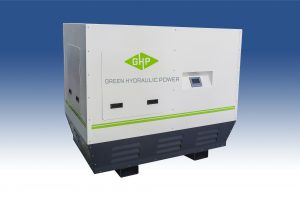
The Green Hydraulic Power line is offered in 100, 200 and 300-gal tank units rated up to 4000 psi and is available in two styles, one with a VFD, asynchronous motor and internal gear pump, while the second has a servo inverter, synchronous servo motor and internal gear pump.
The manufacturing industry has seen vast improvements in technology over the past 30 years. Machines are faster, quieter, and more versatile than ever before. However, the hydraulic power unit, famous for occupying the dirtiest and noisiest corner of any shop, has changed very little. An electric motor drives a hydraulic pump, which pressurizes a fluid reservoir, and most are operated with little more than an on/off switch.
This pressurized fluid is then used to power a broad array of fabrication and forming equipment: die presses, plate rolls, metal shears, spin formers, plastic injection molders—by some estimates, millions of individual machines in U.S. shops alone. Despite its universality in manufacturing, hydraulic power, like shop air and electricity, is viewed like a utility – only garnering attention when it isn’t working correctly. As a result, many manufacturers fail to recognize that their outdated hydraulic power units are costing them money.
That’s why Huntington Beach, Calif.-based MJC Engineering, a builder of CNC metal spinning, rotary forge and flow forming machines, has development a new hydraulic power system, they call Green Hydraulic Power.
The main issue with the standard hydraulic power unit is that they operate at constant volume flow; they run at a fixed speed. Most, lacking any sort of sophisticated control, run nonstop while the machine is in use or idling. Wear and friction anywhere in the pump system reduces the efficiency and longevity of the unit over time. The solution to the problem is a power unit, which implements a variable speed drive. Green manufacturing legislation and incentives, in place in Europe for decades, forced the implementation of efficient variable speed drives for environmental reasons. However, the resulting savings in reduced energy consumption turned out to be staggering. The same technology has seen only limited adoption in the United States due to lack of incentives, low awareness, and the absence of streamlined, retrofittable implementation and support options on our shores.
To combat these challenges, the system provides higher machine yield, reduces noise emissions by 20 dBA, generates less heat, produces a shorter cycle time on various machine types and involves less oil volume, all resulting in a system that saves up to 70% in energy costs to reduce the user’s carbon footprint, according to the manufacturer.
The company will now offer the unit for OEM integration by other machine builders, in addition to displaying its range of metal forming machinery. MJC is a major supplier to automotive, aerospace and the wheel industry.
Green Hydraulic Power is offered as standard on the hydraulic power units provided on MJC machine builds and uses the Siemens SINAMICS variable speed servo pump drive. High-demand hydraulic systems on many machine types see significant improvements using this concept from MJC Engineering, according to company President Carl Lorentzen.
“We saw that the servo pump could control pressure and flow, as they precisely convert electric energy into hydraulic power. In some cases, the use of control valves is partially or completely eliminated, depending on the application. We quickly realized our development could be used on many other types of machinery as an OEM component,” Lorentzen said. “One press release from our ad agency generated substantial new business for the unit and we knew immediately we were onto something big.”
The company has subsequently developed a subsidiary unit, Green Hydraulic Power Inc. and separate sales force for the unit’s development in the market.
The applications are many for this new system concept, according to Lorentzen, as almost all machine tools using hydraulic power are candidates for variable speed servo pump drive technology. Injection presses, materials handling equipment, stamping presses, other metal forming machines and more can utilize Green Hydraulic Power, according to Lorentzen. “We’re finding new applications, almost every day now.”
Complete payback on the system is estimated at 12-24 months and the system has the additional benefit of control data output from the onboard diagnostic capability in the drive that supplies information for a predictive maintenance protocol in an Industry 4.0 scenario. The basics of pressure, temperature and acceleration data measurement are standard, with additional data outputs on oil level, filter condition, running efficiency and other parameters available. The servo pump results in as much as a 70% reduction in onsite servicing, according to the manufacturer.
This new line is offered in 100, 200 and 300-gal tank units rated up to 4,000 psi and is available in two styles, one with a VFD, asynchronous motor and internal gear pump, while the second has a servo inverter, synchronous servo motor and internal gear pump.
Green Hydraulic Power
www.greenhydraulicpower.com
Filed Under: News